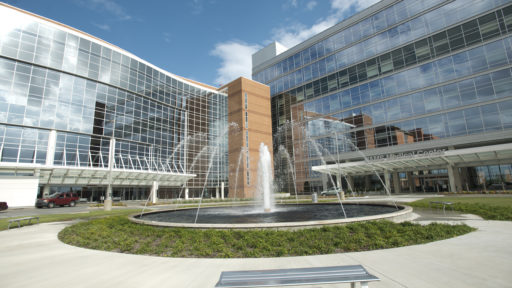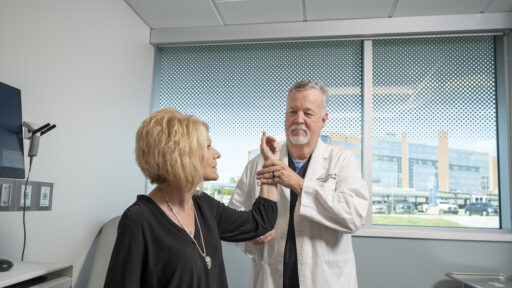Description
Far too often, we avoid going to the doctor when something isn’t right. This often leads to things getting worse, not better. We try home remedies, over-the-counter options or just tough it out when we should be picking up the phone or logging on to UAMS Health’s HealthNow platform and scheduling a visit.
When do you need to talk to your doctor about your knee or hip pain? Dr. C. Lowry Barnes shares what brings people of all ages in to see him and reclaim their lives.
Video Player
Transcript
Hi, I’m Dr. Lowry Barnes. I am a specialist in orthopaedic surgery, and I subspecialize in hip and knee replacement. I’m also chairman of the Department of Orthopaedics at UAMS.
When is it time to go see somebody who does hip and knee surgery? It’s when your pain in your hip or knee interferes with the normal activities. Normal is different for everyone. Certainly, when you can’t sleep at night because your hip or knee hurts, you know it’s time to go see an orthopaedic surgeon because the things you’re doing aren’t working.
Many patients find that they have a difficult time shopping, taking care of their families, doing the cooking, grocery needs, et cetera. Others, it’s much more simple. I have patients who come to see me who have played golf their whole life. They played a couple of times a week. They retire. They can’t play as much golf as they want to play because their knee hurts. So it’s significant to them that they can’t do what they want to do in their years of retirement. So there are lots of things that bring patients to see us. And it’s really an individual thing. What’s a problem for one patient is not a problem for another patient.
And not everybody needs surgery. Many patients need education, exercises and things that they can do outside of the operating room to get better.
Orthopaedic maladies affect the whole gamut of patients, from the young to the old. Many patients, they think joint replacement, and I think that that’s something grandmothers and grandparents have done. I have now treated three generations of patients. I’m 54. I’ve treated patients who went to college with me. I’ve now treated their children and I’ve treated their parents. So it spans the whole gamut of age. Some of my happiest patients are teenagers for whom I’ve done joint replacements. We saw somebody back in our office just about three or four weeks ago. A young teenager had rheumatoid arthritis. Both of her hips were severely involved. Couldn’t walk. In a wheelchair. Very challenged socially because she was different than her peers. We did both of her hip replacements at one operation, and she is now back walking normally, functionally, smiling, normal happy teenager. So it is a life changer not only for the old, but also for the young.
Goals for my patients, do we get them back to doing what they want to do? Nothing makes me better than when I read a card like I read at my office early this morning and the last sentence says, “Thanks for giving me my life back.”




